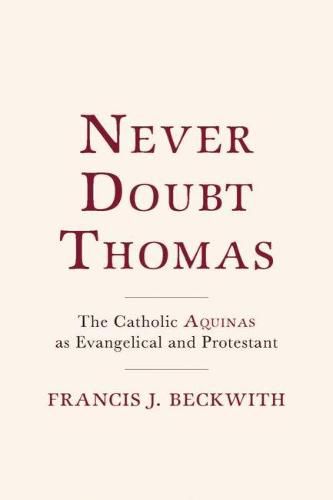Readings Newsletter
Become a Readings Member to make your shopping experience even easier.
Sign in or sign up for free!
You’re not far away from qualifying for FREE standard shipping within Australia
You’ve qualified for FREE standard shipping within Australia
The cart is loading…






Theologian, philosopher, teacher. There are few religious figures more Catholic than Saint Thomas Aquinas, a man credited with helping to shape Catholicism of the second millennium. In Never Doubt Thomas, Francis J. Beckwith employs his own spiritual journey from Catholicism to Evangelicalism and then back to Catholicism to reveal the signal importance of Aquinas not only for Catholics but also for Protestants.
Beckwith begins by outlining Aquinas’ history and philosophy, noting misconceptions and inaccurate caricatures of Thomist traditions. He explores the legitimacy of a
Protestant
Aquinas by examining Aquinas’ views on natural law and natural theology in light of several Protestant critiques. Not only did Aquinas’ presentation of natural law assume some of the very inadequacies Protestant critics have leveled against it, Aquinas did not, as is often supposed, believe that one must first prove God’s existence through human reasoning before having faith in God. Rather, Aquinas held that one may know God through reason and employ it to understand more fully the truths of faith. Beckwith also uses Aquinas’ preambles of faith - what a person can know about God before fully believing in Him - to argue for a pluralist Aquinas, explaining how followers of Judaism, Christianity, and Islam can all worship the same God, yet adhere to different faiths.
Beckwith turns to Aquinas’ doctrine of creation to question theories of Intelligent Design, before, finally, coming to the heart of the matter: in what sense can Aquinas be considered an Evangelical? Aquinas’ views on justification are often depicted by some Evangelicals as discontinuous with those articulated in the Council of Trent. Beckwith counters this assessment, revealing not only that Aquinas’ doctrine fully aligns with the tenets laid out by the Council, but also that this doctrine is more Evangelical than critics care to admit.
Beckwith’s careful reading makes it hard to doubt that Thomas Aquinas is a theologian, philosopher, and teacher for the universal church - Catholic, Protestant, and Evangelical.
$9.00 standard shipping within Australia
FREE standard shipping within Australia for orders over $100.00
Express & International shipping calculated at checkout
Theologian, philosopher, teacher. There are few religious figures more Catholic than Saint Thomas Aquinas, a man credited with helping to shape Catholicism of the second millennium. In Never Doubt Thomas, Francis J. Beckwith employs his own spiritual journey from Catholicism to Evangelicalism and then back to Catholicism to reveal the signal importance of Aquinas not only for Catholics but also for Protestants.
Beckwith begins by outlining Aquinas’ history and philosophy, noting misconceptions and inaccurate caricatures of Thomist traditions. He explores the legitimacy of a
Protestant
Aquinas by examining Aquinas’ views on natural law and natural theology in light of several Protestant critiques. Not only did Aquinas’ presentation of natural law assume some of the very inadequacies Protestant critics have leveled against it, Aquinas did not, as is often supposed, believe that one must first prove God’s existence through human reasoning before having faith in God. Rather, Aquinas held that one may know God through reason and employ it to understand more fully the truths of faith. Beckwith also uses Aquinas’ preambles of faith - what a person can know about God before fully believing in Him - to argue for a pluralist Aquinas, explaining how followers of Judaism, Christianity, and Islam can all worship the same God, yet adhere to different faiths.
Beckwith turns to Aquinas’ doctrine of creation to question theories of Intelligent Design, before, finally, coming to the heart of the matter: in what sense can Aquinas be considered an Evangelical? Aquinas’ views on justification are often depicted by some Evangelicals as discontinuous with those articulated in the Council of Trent. Beckwith counters this assessment, revealing not only that Aquinas’ doctrine fully aligns with the tenets laid out by the Council, but also that this doctrine is more Evangelical than critics care to admit.
Beckwith’s careful reading makes it hard to doubt that Thomas Aquinas is a theologian, philosopher, and teacher for the universal church - Catholic, Protestant, and Evangelical.